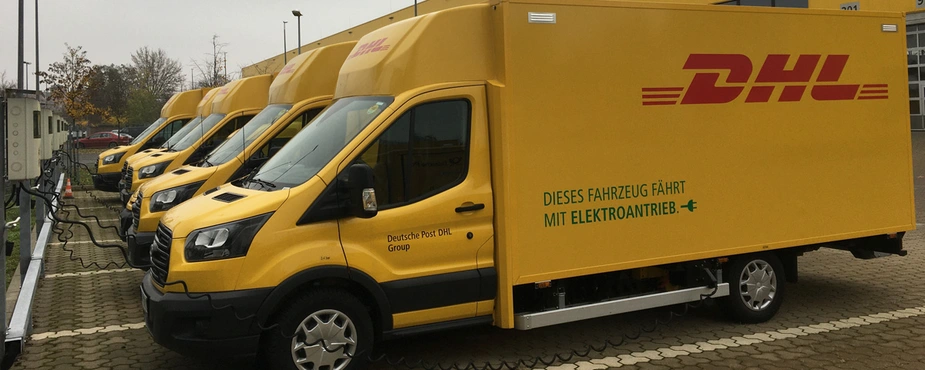Flexible charging strategy in electrified logistics fleets can relieve pressure on power grids
Reiner Lemoine Institute (RLI), IAV and E.DIS Netz GmbH presented the results of the research project Netz_eLOG on the intelligent grid integration of e-mobility
Electric fleets in the logistics industry offer secured flexibility for the power grid. Together with grid-serving charging strategies, they can help to avoid bottlenecks or overloads in distribution grids and make more flexible use of electricity from renewable sources. These are the findings of the Netz_eLOG project team. In it, the Reiner Lemoine Institute (RLI), IAV and E.DIS Netz GmbH used the example of a Deutsche Post vehicle fleet in Kleinmachnow to investigate the effects of electromobility on power grid.
In a practical test with 30 electric vehicles (StreetScooters) from Deutsche Post AG, the consortium analyzed how the fleet can be used as a flexible load for efficient operation of the E.DIS distribution network. For this, operational requirements of the logistics company were taken into account, such as security of supply and economic efficiency. The results show: With the help of grid-serving charging strategies, the power consumption of vehicles can be adapted to a fluctuating feed-in of renewable energies. This helps, for example, to reduce feed-in-related load peaks in the power grid. Simulations for suitable grid areas also showed that up to a quarter of the charging power for a comparable fleet of vehicles could be provided by power from generation plants that would have been curtailed without this strategy.
“Current proposals from the EU Commission for a reduction target of 90 percent less CO2 in commercial vehicles by 2040 will further drive the ramp-up of electromobility. Our project shows that grid-serving charging strategies can support the energy transition, especially in the logistics sector. We also see that, under the right conditions, grid-serving charging can reduce costs for fleet and grid operators. To achieve this, we now need to further develop grid charges as an incentive system,” says Jakob Gemassmer, project manager and researcher in the unit Mobility with Renewable Energy at RLI.
Vehicle fleet as a large battery
The project team has found that e-vehicles in a fleet with similar arrival and departure times can offer distribution grid operators assured flexibility. Such fleets are able to implement specific power requirements of the grid operator within a clear standing time. The fleet serves as a large stationary battery. Its flexibility as a mobile storage unit is always limited to the idle times of the vehicles.
Successful grid-serving control
In the practical test, E.DIS was able to send control signals for the fleet’s charging processes directly from the control center and thus, for example, implement a desired charging schedule in the project. The prerequisite for this was an IoT platform developed by IAV as a Software as a Service application. Among other things, charging points, power measurement values and the control center for network operation were connected there. The values relating to the location and the vehicles, such as energy consumption and departure time, served as input variables for the control system. With the application and corresponding data, the project team generated charging plans for the future and learned from past charging behavior.
The basis for secure message transmission to the charging station was the Open Charge Point protocol. This interoperable communication with the charging points and the connection to the control center of the grid operator are prerequisites for the use of grid-serving flexibility.
Open source model for charging strategies developed
Analyses in different network areas and for further use cases yield similar results to the practical test with DHL. For this purpose, RLI has developed SpiceEV, an open-source model for the simulation and analysis of charging strategies. This was used to examine other fleets from the logistics, retail or service sectors.
About the project: The German Federal Ministry of Economics and Climate Protection is funding the project from November 2019 to March 2023. The results were presented in Potsdam on March 10. More information about the project: reiner-lemoine-institut.de/en/intelligent-grid-integration-e-mobility/
About the RLI: The Reiner Lemoine Institute (RLI) is an independent, non-profit research institute that has been working for a 100 percent renewable energy future since 2010. The scientists of the RLI conduct application-oriented and scientific research for the energy and transport transition in Germany and internationally. Since its foundation, the open source models developed at the institute have become firmly established in energy system modeling. RLI’s mobility and electrification concepts are implemented by companies and the public sector worldwide.
More information on the topic of grid integration of electromobility at the RLI: reiner-lemoine-institut.de/en/research-fields/sp-grid-integration-of-e-mobility/
About E.DIS: E.DIS AG with its subsidiary E.DIS Netz GmbH is one of the largest regional energy network operators in Germany. With about 2,500 employees including about 170 trainees, the E.DIS Group is one of the largest employers in the new federal states. Every year, E.DIS invests well over 100 million euros in its networks, which have a line length of around 80,000 kilometers. Approximately 1.3 million households, commercial and industrial enterprises in Brandenburg and Mecklenburg-Western Pomerania are connected to this network.
About IAV: As one of the world’s leading engineering and technology partners to the automotive industry, IAV is developing the digital mobility of the future. The company has been developing innovative concepts, methods and solutions for 40 years, generating sales of €837 million in 2022. With 7,600 employees, IAV brings together the best from a wide variety of worlds: Automotive and IT worlds, hardware and software worlds, and product and service worlds. In addition to vehicle and powertrain development, the company focused on topics such as e-mobility and autonomous driving at an early stage and is now one of the leading technology providers in these fields.
Contact:
Communication
Timo Beyer
Communication
Phone: +49 30 12084 3415
Email: presse(at)rl-institut.de
Project Manager RLI
Jakob Gemassmer
Researcher and project manager
Research unit Mobility with Renewable Energy
Phone: +49 30 1208 434 85
Email: jakob.gemassmer(at)rl-institut.de
Press release RLI, 10 March 2023
